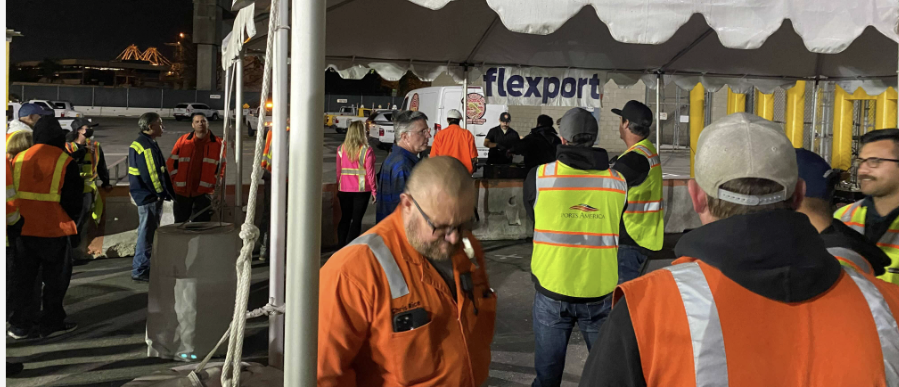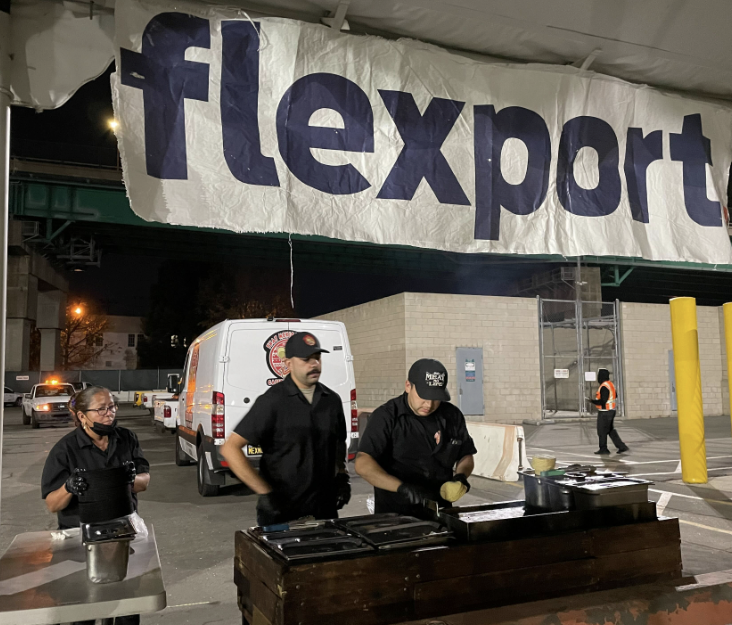Last night Flexport brought a taco truck to the Port of Long Beach as a big thank you to the ILWU laborers there working like crazy to clear this container backlog. A thread on what we learned! /1 



First off, they told us that Flexport is the first outside company in the history of the port to send in a food truck as a sign of gratitude. They loved it. /2
During our evening at the port only one truck showed up. The 24/7 gates don't matter if nobody comes to pick up the containers. Big opportunity for companies that can operate their receiving facilities at night and send trucks to the port when there is no line. /3
For all of second shift they are seeing 50 trucks or less on most nights. Trucks aren’t even coming in after midnights. They have had nights with zero trucks. Despite that, appointments are “full.” They have so many no-shows they don’t know how to plan the yard. /4
No pulls mean a full yard. Between dwelling imports and empties, there is no room to place new containers in the yard. A ship they would normally work with 4-6 cranes they have 2 on. /5
Those 2 are still pumping 30+ containers an hour, but they can’t push more because the containers have nowhere to go. /6
They are loading empties out. That isn’t a restriction. But with only 2 cranes they run out of time and have to cut the ship loose. /7
Rail has caught up. They have almost no rail containers left waiting to go out. This is a huge win and freed up additional yard space (which quickly filled). /8
Equipment is an issue. The one spot they are truly short labor is on maintenance. Spare parts are in short supply. So even if they did ramp into full ops they would struggle with yard equipment. *But there are chassis. /9
A lot of them are dedicated to one carrier but they do have chassis. The problem though is as they issue them out, and they break, there is no way to fix them. /10
Those chassis are for an on-wheels premium service but they can’t put the containers onto the chassis because they have nowhere to park the chassis. /11
They are not intentionally slow working. COVID is not an issue. There is no intentional labor slowdown. They want more shifts. They want to work. /12
But also even if they went to 24/7 ops is would just look like more of the above. They don’t have enough skilled labor and management to work full out 24/7. How long would it take to get there? A year or more. Less working, after all, means fewer training opportunities. /13
Quick to note that they blame no one. Really, they don’t. They find it all very interesting but at the end of the day they clock in, do their jobs, and go home to their families. They truly love the work and are proud of what they are doing. /14
Big shoutout to the Flexport LA team that pulled this taco Tuesday together and approached the workers with such empathy that we got this very clear picture of life on the ground right now. It's so easy to point fingers in the midst of a crisis. /15
Super important that we continue to gather the best real time insights (observe), put that information in context with the right people who need to know (orient), make decisions (decide), take decisive action (act). /16
By iterating through this OODA loop with incredible velocity (not just speed, but speed in the right direction), Flexport can work with the entire supply chain ecosystem to fight through the friction that is making the seemingly easy feel impossible right now.
It's a very exciting time to work in supply chain. The pressure is on. Time for us all to step up.
• • •
Missing some Tweet in this thread? You can try to
force a refresh




